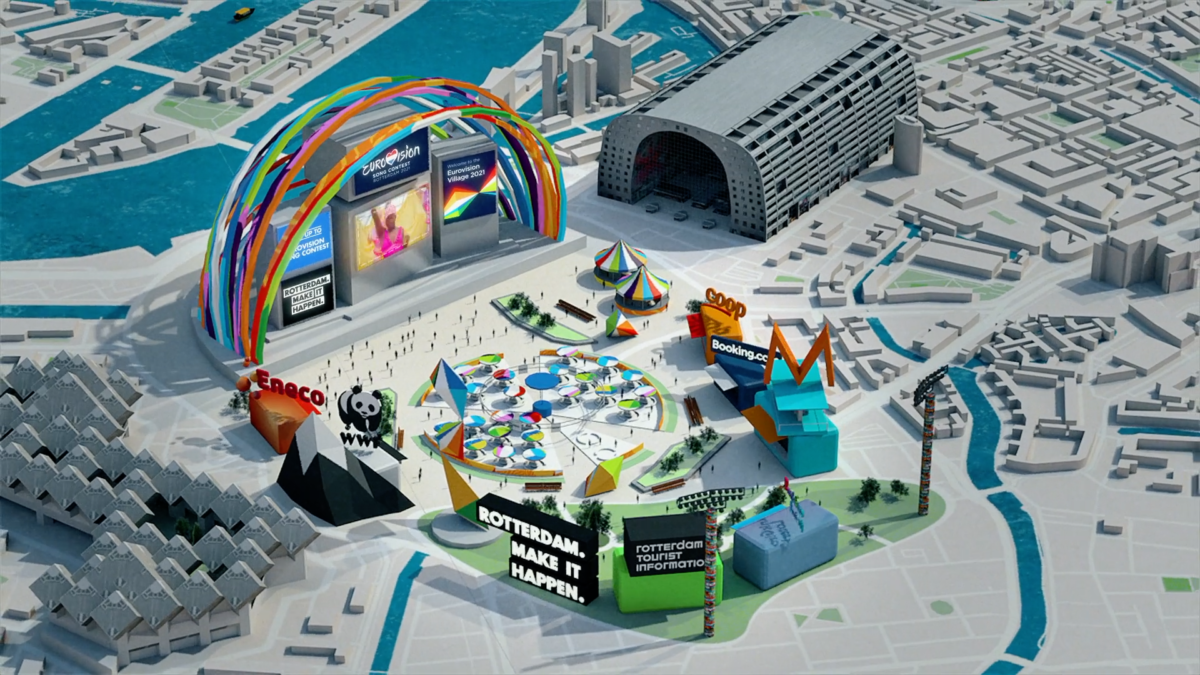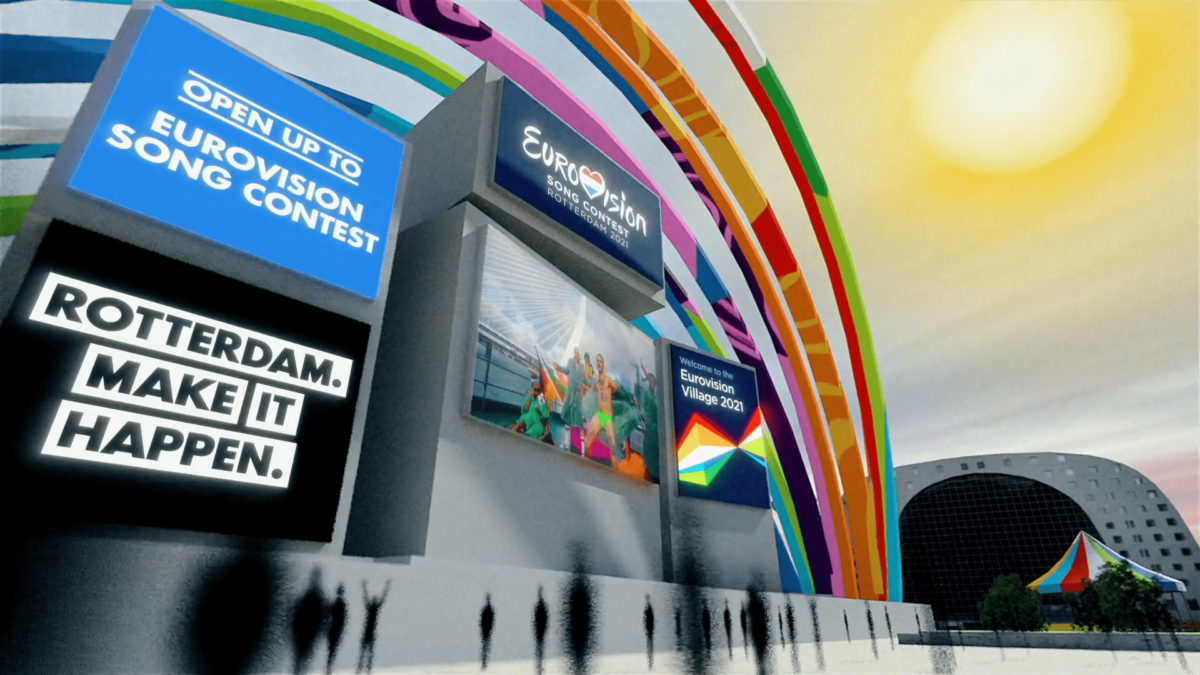Eurovision
The Eurovision Song Contest is the world’s longest-running, international music competition. Since its inaugural event in 1956, 52 countries have participated at least once, creating a fan base that stretches across the globe. Today, over 180 million people tune in to watch the televised competition, with over 20,000 attendees travelling to the host country to enjoy the contest in person.
Usually, The Eurovision Village sits at the heart of the physical experience of the contest; it’s a place where fans can meet up to enjoy the music, socialise and embrace the positive vibes. With the pandemic preventing mass gatherings, for the 2021 contest, Rotterdam Festivals reached out to entertainment agency Tribe Company and DEPT® to recreate the physical atmosphere of The Eurovision Village in a virtual world. The result? A groundbreaking virtual experience; the first of its kind in the Eurovision Song Contest history.
Imagining an electric experience
“If the world can’t come to Rotterdam, we’ll bring Rotterdam to the world”. Early in the creative process, we sought out ways to showcase the spectacle of the stage performances, while conveying the energetic buzz of Rotterdam. Touring the host city is such an important part of attending an international event, and we didn’t want the tens of thousands of people that would normally make the trip to miss out on this experience. Plus, the opportunity to open Rotterdam up to the world to explore was an exciting challenge.
We wanted to evoke the same feeling in the fans as a physical visit; a simple platform filled with live streams wouldn’t suffice. Our creative inspiration led us to design a 3D world, where visitors are invited into a new surrounding to immerse themselves in the magic of the Eurovision Song Contest.

Designing a 3d world
The Eurovision Song Contest was held in the Rotterdam Ahoy arena, which became a primary focal point within the interactive 3D map. The cosmopolitan Binnenrotte market square is a vibrant place where party-goers can meet virtually and watch live-streamed DJ sets and performances. Fresh content is served up daily here, aiming to build excitement around all the Eurovision Song Contest has to offer, with tips to complete your best Eurovision Song Contest look, interviews and behind the scenes video.
The 3D world encapsulates Rotterdam’s cityscape with modern architecture, cube houses and landmarks. The map features some of Rotterdam’s most impressive sites, including the Erasmus Bridge, the Euromast and Markthal. People from all over the world can virtually explore these iconic buildings, meet local heroes, learn interesting facts and feel the atmosphere of the city.
How the vision is powered by technology
All of the components that make up the virtual Eurovision Village are built entirely in 3D; from the interactive sites to the sponsorship logos, the houses, trees and everything in between. In just three weeks, we brought this creative concept to life.
The JavaScript API, WebGL (Web Graphics Library), was the underlying technology used to render the high-performance interactive 3D graphics, ensuring they’re optimised for all browsers. Three.js worked with WebGL to form the 3D library and provide the right utilities and tools. The frontend framework was formed by React.js, a JavaScript library for building user interfaces. Finally, templates for the website pages were built in the Azure continuous integration and continuous deployment (CI/CD) pipeline, which pushes changes automatically to Web Apps, served by the Cloudflare CDN. These new technologies working together created a dynamic solution that’s only 15MB, which is a remarkable achievement for such a large platform.

Managing the live environment
The CMS also played an important role in development. By using Contentful, employees of content agency Snip Snap, are able to interact with guests throughout the song contest and adjust content in real-time to communicate updates, such as changes to the line-up.
To create a system that can move easily with the real world, we developed a digital twin of the Eurovision Village that is linked to the 3D environment. This extra layer gives us insights to improve operations, increase efficiency and iron out any problems or issues that arise before they become apparent in the version visible in the real world.
A stable solution for scale
The Eurovision Song Contest is the world’s largest non-sporting TV event. This year’s Village programme was predicted to grab even more attention with crowd-pullers including Duncan Laurence, Johnny Logan, Afrojack, and the Junior Song Festival, running alongside the City Programme that offered more than 50 fringe events.
The Eurovision Song Contest is the world’s largest non-sporting TV event. This year’s Village programme was predicted to grab even more attention with crowd-pullers including Duncan Laurence, Johnny Logan, Afrojack, and the Junior Song Festival, running alongside the City Programme that offered more than 50 fringe events.
Data from the last competition showed younger audiences are watching the Eurovision Song Contest in greater numbers, and viewership on YouTube during the week of the festival is also on the rise. This evolving viewing behaviour, as well as the depth of the new virtual experience, means more people were likely to watch online and, therefore, the platform had to be stable enough to host a rush of global traffic.
Performance, usability and accessibility were essential in the design and carried through into development. The platform is hosted in 12 different regions around the world on Microsoft Azure App Service Plans, and supported by a cloud-based fallback infrastructure, ensuring high traffic accessing the platform is optimally distributed and not dependent on the same type of resources.
The Eurovision Song Contest is acclaimed for being an inclusive event. The theme ‘Open Up’ was selected for this iteration with the warm message of inviting people to open up to others, to different opinions, each other’s stories and of course to each other’s music. Eurovision’s use of technology had to be an extension of these values and not inadvertently exclude anyone.
Applauding our collaborative approach
The Eurovision Song Contest, its lively village and iconic surroundings were open 24/7, free of charge during the nine-day duration of the festival. The strong collaboration between Rotterdam Festivals, DEPT® and Tribe Company was the key ingredient that led to us delivering this ambitious project at a rapid pace.
Nobody knows exactly what the world will look like in a few months, but it is very plausible that virtual solutions will occupy a permanent place. The 3D virtual village we created for the Eurovision Song Contest demonstrates how a digital world can maintain the offline feeling, truly connecting people, while providing global access for everyone. This project is proof that with the right efforts, even the most legendary events can be turned into a digital success.
